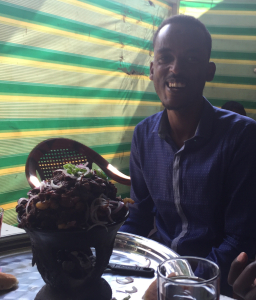As SCOPE takes on a major research study, the team working here in Gondar has expanded. While Getahun and Adino provide leadership, Sheldon and I also work closely with local Data Collectors and Gondar-based SCOPE Fellows to do the ‘legwork’ of the study (like visiting rural health centers). The Fellows and Data Collectors are our travelling partners, translators, and collaborators in the SCOPE work here. And as our time is beginning to wind down here in Gondar, we wanted to thank them.
What better way to say ‘thank you’ than with grand amounts of food? There was just one catch- our colleagues are all Ethiopian Orthodox Christians, and they ascribe to a detailed fasting schedule. Every Wednesday and Friday are fasting days, with extra periods of fasting prescribed for especially holy seasons. In total, the most devout members of the church fast for over 200 days per year! (For Ethiopian Orthodox adherents, fasting means nothing to eat or drink until about 3pm, and no animal products after that.)
A major fast recently ended, and we knew that an even bigger season of fasting was approaching with the Christmas season. So last week, we called the Fellows and Data Collectors together over a calendar to strategize. “When can we feast?”
There was only one day before our mid-December departure on which everyone agreed they could eat, and we were thrilled when we realized it fell only two days before American Thanksgiving! We would celebrate with an Ethiopian style meal to show our thanks for the Data Collectors’ and Fellows’ hard work.
Ethiopians love beef, and the streets in our neighborhood are filled with restaurants specializing in fresh meat. The beef is displayed prominently at the front, where it can be ordered by the kilogram. Then it is taken to a roaring fire in the back, cooked to perfection, and served on a sizzling brazier stuffed with red hot coals underneath. The slices of piping hot meat, called shekla tibs, can be eaten straight with one’s hands, or wrapped in bits of injera or bread and dipped in hot berbere sauce.
We knew that shekla tibs would be a special treat for our colleagues. So for lunch on Tuesday, we invited them to meet us at a local restaurant, where we ordered a feast of meat.
SCOPE Fellows and Data Collectors share a meal of thanks
There were smiles all around. I reminisced with the Data Collectors about our adventures visiting remote health centers.
“I remember when we had to hike through the mud,” Mehari told me, chuckling, “you slipped and fell in a puddle and I was sure you would be angry but instead you just laughed!”
Sheldon and I spoke about our plans- to finish grad school in June and continue working in global health. They updated us on their plans; most are either finished or almost finished with their Master’s degrees. Many spoke of their dreams of continuing school to obtain a PhD. Their eyes shone as they discussed future work on the FLAME study. After Sheldon and I leave in December, the study will continue into the intervention phase, building upon the work and training that we have all shared over the past five months.
SCOPE Fellow Kindalem with fresh Shekla Tibs
Sheldon and I said thank you. Thank you for teaching us so much about Ethiopian culture and for being patient with our learning. They asked us to remember them when we went home, and we said, “how could we forget?”
The next season of fasting begins this week. Many of the beef restaurants will simply close for the season. Once again, our colleagues will demonstrate with ease how they integrate their scientific work and their religious devotion. But before that begins, we got to share a Thanksgiving feast together.
After we returned from the Thanksgiving meal, I checked my phone for messages and found an especially touching one from our Data Manager, Malede.
“Wow. I feel proud to belong to this team.”



